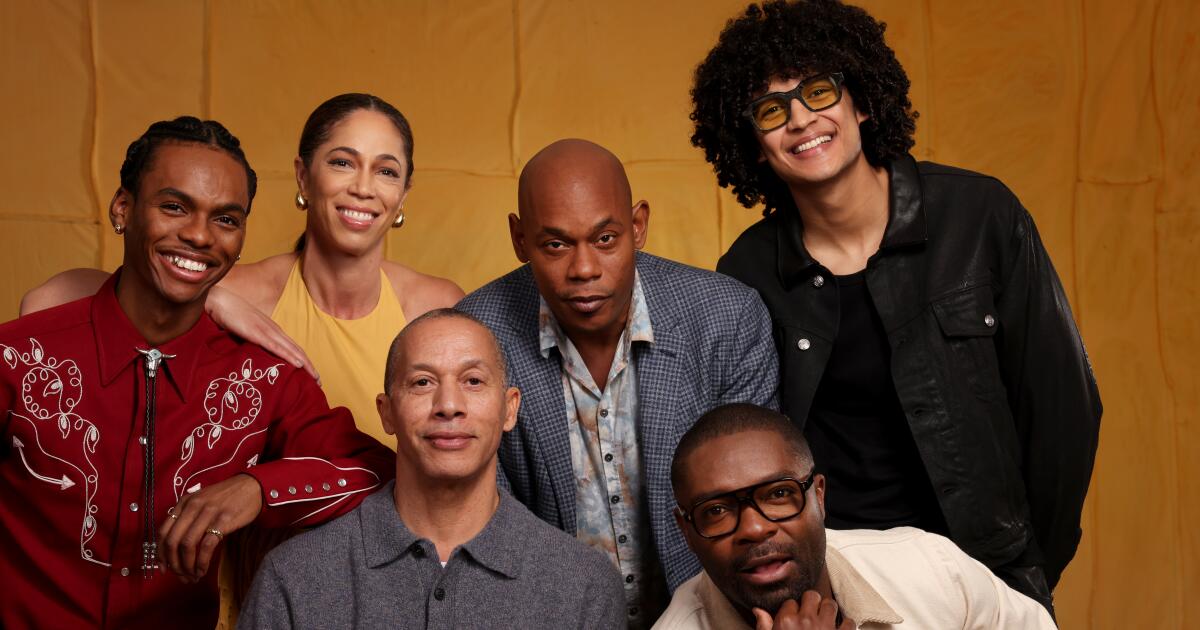When Paul Hunter started shopping around his script for an autobiographical movie called “Government Cheese,” about a Black family living a surreal life in the San Fernando Valley during the late 1960s, he kept getting variations on the same rejection: We don’t know any Black people like this. These aren’t Black characters that we’ve ever seen. “I was like, ‘Dude, this is my family,” Hunter recalled recently. “There’s a whole ‘nother side of the culture that you don’t know about.’”
Eventually, Hunter, who has directed music videos for such diverse musical artists as LL Cool J, Lauren Hill, Marilyn Manson and Deftones, turned “Government Cheese” into a short, starring David Oyelowo (“Selma”). And now it is a series, premiering on Apple TV+ on Wednesday, where seemingly nothing is too imaginative and out there (see: “Severance”). A pastel-blasted Valley vision, with symmetrical visual compositions in a Wes Anderson vein and a brazenly nontraditional story structure, “Government Cheese,” created by Hunter and Aeysha Carr, easily fits Hunter’s artistic imperative: “What I have always tried to do, as a storyteller and as a creative, is not be put in a box.”
The “Government Cheese” box would have a most unusual shape. Oyelowo stars as Hampton Chambers, fresh out of Chino State Prison after doing a bid for check fraud. Returning to his spacious home on a wide, sunny street, Hampton expects a happy welcome. He doesn’t get one. His wife, Astoria (Simone Missick), has freshly kindled ambitions for a career in interior design. His youngest son, Harrison (Jahi Di’Allo Winston), is sullen and resentful. His oldest, a budding genius appropriately named Einstein (Evan Ellison), is applying to colleges, but he seems more interested in perfecting his pole vaulting technique. As the Notorious B.I.G. once rapped, things done changed.
But Hampton has a dream. He has invented a self-sharpening drill — the Bit Magician! — and he’s eager to sell it to an aerospace company down the road. He also has further criminal crosses to bear. He owes money to a local French Canadian crime family, and his old running buddy, Bootsy (Bokeem Woodbine), wants him to help rob the local Jewish temple. There’s also the matter of a giant catfish that carries a bellyful of biblical implications.
Hunter put a lot of his imagination into “Government Cheese,” but also a lot of his life story. His father did go to prison, and returned to a strange new world when he got out. Hunter did grow up in the Valley, and in the Bay Area, and he sold cutting tools for an aerospace company. Like Harrison, the youngest Chambers son, he was deeply enamored of Native American culture; in the series Harrison sees one of his dad’s convict friends, Rudy (Adam Beach), as a mentor — the character is based on one of Hunter’s Valley neighbors, an Apache man also named Rudy.
On a deeper level, however, Hunter wanted to convey what it feels like to be a Black family that defies expectation and lives in a sort of bubble, cut off from the radical cultural currents of the times.
“When I was growing up in the early ‘70s, there was a lot going on with the Black Panthers and all that kind of stuff,” he said. “My family didn’t really focus on that stuff. We just kind of stayed in our own world.”
He compared the characters to the Addams Family. “It’s this group of people in their own world, and I wanted to express the feeling of being different compared to what people thought the way we should be, especially as Black people,” he added.
Oyelowo, also an executive producer, has a ready description of the tone: “it’s a parabolic surrealist absurdist family comedy,” he said in an interview. (“David has a lot of words,” Carr joked in a separate interview.) In one episode, as Astoria watches a coffee commercial typical of the period, the housewife on the television set appears in the Chambers family home. Astoria offers a critique of the coffee woman’s domestic submissiveness. “The coffee is a metaphor for taking care of your husband,” the unexpected visitor replies.
Carr, who was also a writer and producer on “The Carmichael Show,” was struck by Hunter’s instinct for bringing written ideas to visual life. “I come from this place of being a writer and being invested in story and character,” she said. “He really opened my eyes about how to tell stories more visually. He’s just a very visually beautiful human.”
Hunter previously directed one feature, “Bulletproof Monk” (2003), which he found unfulfilling. “I was pretty young, and I didn’t really have a voice in it,” he said. He made his name with music videos and commercials, including a revered Nike spot, “Freestyle,” that deftly blends the rhythms of basketball and hip-hop. But he continued to think in big-screen images, even when he got the chance to make “Government Cheese” for the small screen.
“We have 10 episodes, and I thought perhaps we could make them like short films and have them all sort of connect in an interesting way,” he said. He found some color inspiration in old Polaroid photographs: “The way the sun comes up in the Valley, it kind of washes out the buildings. All the paint fades.”
In real life, government cheese was the name for a processed cheese given to low-income Americans, food banks and schools through a program started in the ‘50s. It can signify poverty, but, as Oyelowo points out, it can also suggest resourcefulness, the ability to create and improvise something new and unexpected out of the available ingredients.
If this describes Hampton Chambers, it also describes Paul Hunter.

